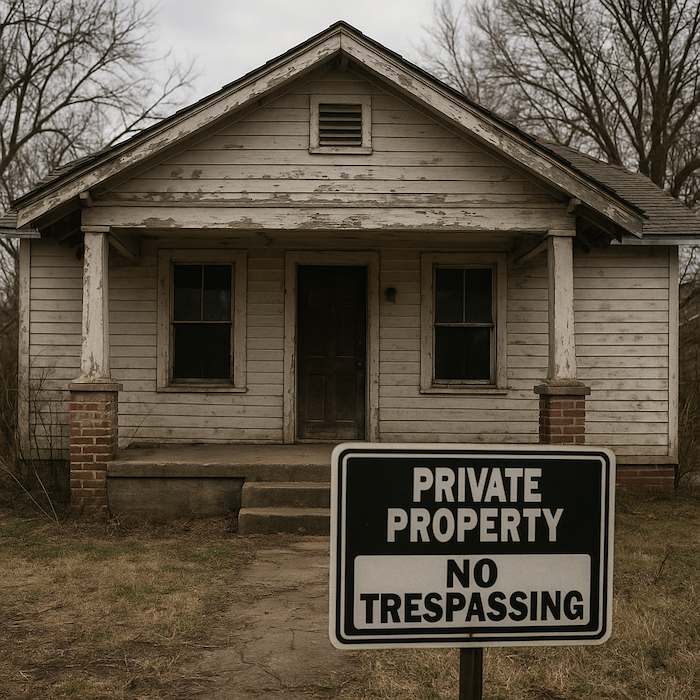Key Takeaways:
- Squatters in Arkansas must be removed through the legal process.
- Adverse possession requires 7 to 15 years of continuous occupation.
- Police handle trespassing, while sheriffs enforce court eviction orders.
- Act 238 makes unlawful squatting a criminal offense in Arkansas.
- Paranova Property Buyers helps homeowners sell properties fast, even with squatters inside.
Table of Contents

Discovering squatters in your Arkansas property can be stressful and confusing. Understanding squatters rights and the proper legal steps is essential to protect your home and avoid costly mistakes. This guide explains what squatters rights mean in Arkansas and how homeowners can remove unwanted occupants quickly and lawfully.
What Are Squatters Rights in Arkansas?
Squatters rights in Arkansas refer to certain legal protections that can apply when someone occupies a property without permission. Although squatters do not have the same rights as tenants, property owners must still follow the proper legal process to remove them. Arkansas law prevents homeowners from using force or self-eviction to take back possession.
In some rare cases, long-term squatters can claim ownership of a property through a process called adverse possession. This requires 7 years of continuous occupation if the person has color of title or 15 years without it, along with proof that they have maintained and paid taxes on the property. For most homeowners, the concern is short-term squatters, which is why knowing the correct legal steps is so important.
How to Remove Squatters Legally in Arkansas
If you discover squatters in your Arkansas property, begin by contacting local law enforcement. The police can determine whether the situation qualifies as criminal trespassing or a civil matter. If the squatter claims any right to stay, such as having paid rent or being allowed in by someone else, you will likely need to begin a court process called an unlawful detainer.
An unlawful detainer is the formal legal procedure used to remove someone occupying a property without permission. You must file this case in the circuit court for the county where the property is located. After filing, the court will issue a notice to vacate. If the squatter does not leave by the deadline, the court can issue a writ of possession, which authorizes the county sheriff to physically remove the occupants. This process ensures that the removal is fully legal and protects the homeowner from liability.
Legal Process Overview
1. Confirm the situation
Contact local police to verify whether it is trespassing or a civil matter.
2. Serve a notice to vacate
Provide written notice giving the occupant a short period to leave, usually five days for non-tenants.
3. File an unlawful detainer
Submit the necessary paperwork at your county circuit court if the squatter remains after notice.
4. Attend the court hearing
If the court rules in your favor, a writ of possession will be issued.
5. Sheriff enforcement
Only the sheriff has legal authority to remove the occupant. Once the writ is issued, the sheriff will schedule and carry out the removal.
Act quickly once you notice unauthorized occupancy. Delays can make the process longer and sometimes allow squatters to gain additional protections under the law.
How to Prevent Squatters in Arkansas
Preventing squatters is much easier than removing them. Start by keeping your property secure with strong locks, sturdy windows, and visible no trespassing signs. Maintain the yard, remove mail buildup, and ensure the property looks lived in to discourage unwanted occupants.
If you own vacant or rental properties, inspect them regularly or hire a trusted local property manager. Keeping certain utilities active, such as exterior lights or security systems, can make the home appear occupied and reduce the risk of squatting.
Consistent maintenance and visibility are the best ways to protect your property and avoid the challenges of dealing with squatters.
Squatter vs Trespasser vs Tenant
Understanding the difference between a squatter, a trespasser, and a tenant is key to handling the situation correctly.
A trespasser enters a property without any permission and typically does not intend to stay. In most cases, police can remove a trespasser immediately since it is a criminal offense.
A squatter stays on a property without permission and treats it as their home. They may move in while the property is vacant or after a tenant leaves. Once they claim to live there, police often consider it a civil matter, meaning the owner must go through the court process to remove them.
A tenant has a valid lease or rental agreement. Even if they stop paying rent or overstay their lease, they still have legal rights as tenants. Removing them also requires going through the formal eviction process.
Knowing which category applies helps homeowners decide whether to call the police or file a case in court.
Role of Police and Sheriff
In Arkansas, both the police and the county sheriff can be involved in removing squatters, but their roles are different.
Police handle criminal activity such as trespassing, vandalism, or breaking and entering. If the occupant clearly entered without permission and does not claim any right to stay, the police can order them to leave or make an arrest. However, if the person claims to live there or shows evidence such as mail, furniture, or personal items inside, the police usually treat it as a civil matter. In that case, they cannot remove the person without a court order.
The sheriff becomes involved after the court issues a writ of possession through an unlawful detainer case. The sheriff is the only official legally authorized to carry out the physical removal of a squatter. Once the writ is issued, the sheriff schedules the eviction and ensures it happens safely and lawfully.
Understanding this distinction helps property owners avoid frustration and follow the correct legal steps from the start.
What Not to Do
When dealing with squatters, it is important to avoid actions that could create legal problems for you as the property owner. Even though squatters are occupying your property without permission, Arkansas law still protects them from unlawful eviction methods.
Do not change the locks, remove their belongings, or shut off utilities to force them out. These actions can be considered self-eviction, which may expose you to civil penalties. Avoid making threats, entering the property without notice, or attempting to remove the occupants by force.
The safest and most effective approach is to follow the legal process. This means contacting law enforcement first, serving proper notices, and filing an unlawful detainer if necessary. Taking the correct legal steps ensures the eviction is valid and prevents the squatter from gaining any advantage in court.
Act 238 — Arkansas’s New Law on Unlawful Squatting
In 2025, Arkansas passed Act 238, a new law that makes unlawful squatting a criminal offense. The law gives property owners an additional tool to address squatters more quickly.
Under Act 238, it is a Class B misdemeanor for someone to enter and live in a property without permission or legal authority. The law requires anyone claiming the right to stay to show proof, such as a deed, lease, or rent receipt, within 60 days of being notified. If they cannot provide valid evidence, they are considered to be residing unlawfully and can face criminal charges.
This new law works alongside the existing civil process. Homeowners may still need to file an unlawful detainer in court to recover possession, but police now have clearer authority to act when an occupant has no legal claim.
Act 238 is designed to protect property owners from bad-faith squatters while keeping due process in place for legitimate renters or leaseholders.
Frequently Asked Questions
The timeline depends on the county and court schedule. Once you file an unlawful detainer, removal typically takes between 2 and 6 weeks if the process is uncontested.
Yes, but it is rare. Adverse possession requires 7 to 15 years of continuous, open occupation plus proof of tax payments and maintenance.
Yes, but police usually act only if it is a clear trespassing case. If the person claims any right to stay, the issue moves to civil court through an unlawful detainer.
Not always, but legal help can make the process faster and ensure proper filings. This is especially useful if the squatter contests the eviction.
Yes. Many buyers, including Paranova Property Buyers, purchase homes as-is, even with squatters or legal complications in place.
When to Sell and Move On
Dealing with squatters can be stressful, time-consuming, and expensive. Even after following every legal step, the process can still take weeks or months depending on the circumstances. For some homeowners, especially those who live out of town or have inherited vacant properties, selling the home may be the best solution.
At Paranova Property Buyers, we help Arkansas homeowners sell houses quickly, even if squatters are still inside. We handle the challenges so you can move forward without legal headaches or ongoing costs. If you are tired of dealing with squatters or a vacant property that attracts unwanted attention, contact us for a fast and fair offer today.



